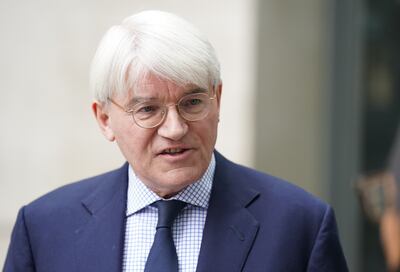Live updates: Follow the latest news on Israel-Gaza
The “suffering of ordinary Palestinians” in the Israel-Gaza war must push global powers into finding a peaceful outcome, Britain’s International Development Minister has said.
Andrew Mitchell also warned the war had the potential to “radicalise” people across the world, causing further conflict. For that reason, he said a political settlement was sorely needed. “This issue is uniquely polarising, we have seen across the world and in our own communities its potential to radicalise,” Mr Mitchell added.
Mr Mitchell on Wednesday told the UK Parliament that Britain had joined pressure on Israel to open the Kerem Shalom crossing as it urgently explored ways to get aid into Gaza other than the Rafah checkpoint. "We are urging Israel to consider utilising these facilities and other border crossings into Gaza, such as Kerem Shalom," he said.
While Mr Mitchell said Israel had the right to self-defence following the Hamas attacks on October 7, the international community was “committed to discharging our moral duty to alleviate the suffering of ordinary Palestinians”.
The Development and Africa Minister said the “current turmoil must act as a further impulse towards realising a peaceful future for the region”.
To prevent further conflict and terrorism “and truly alleviate civilian suffering”, there has to be a political solution to the war, he said.

The urgency for a political solution had “never been more clear” because the Palestinians had “a right to live in peace and security”.
“The long-standing British position on the Middle East process is unchanged,” he added. “We want to see a safe and secure Israel living alongside a viable and sovereign Palestinian state.”
While Britain has sent 61 tonnes of aid to Egypt and a limited number of lorries had entered Gaza, this was “nowhere near enough to meet civilian needs”, Mr Mitchell said.
“We are therefore urgently exploring with partners measures which can help increase the flow of humanitarian support.
“These measures include effective humanitarian pauses, as agreed by all the G7 countries in Tokyo this morning, and we are urging Israel to consider utilising these facilities and other land border crossings into Gaza.”
The conflict was described as a “children’s war” by opposition shadow international development minister, Lisa Nandy, who highlighted the average age in Gaza was only 18.
The Labour MP said the current amount of aid arriving was “completely insufficient” and fuel was an absolute requirement because without it the “water cannot flow, hospitals cannot power incubators and food cannot be cooked”.
Gaza faces a “major public health crisis” and she decried Israel’s failure to listen to international demands for “the siege conditions to be lifted”.
“Make no mistake, this is a children's war,” she told MPs. “More children have died in Gaza in four weeks than in all of the world's conflicts in each of the last three years.”
She called for humanitarian pauses in the fighting to provide not only aid but “space for the basic humanity to bury the dead”.


